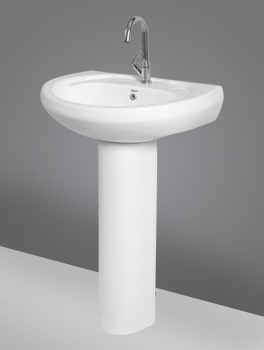
Across Asia, local manufacturing of ceramic wash basin pedestals reflects a rich tradition of artisanal craftsmanship and heritage. From India to China, Japan to Indonesia, these countries showcase unique styles and techniques that contribute to the aesthetic appeal and functionality of ceramic wash basin pedestals. Let's explore the artisanal craftsmanship behind ceramic wash basin pedestals in major countries of Asia:
India:
In India, ceramic wash basin pedestals are crafted using a blend of traditional techniques and modern innovations. Artisans in regions such as Morbi in Gujarat and Khurja in Uttar Pradesh specialize in handcrafting ceramic pedestals with intricate patterns, geometric designs, and ornate embellishments. Each pedestal is a testament to India's diverse cultural influences, with motifs inspired by Mughal architecture, Rajasthani art, and South Indian motifs. Indian ceramic wash basin pedestals are prized for their craftsmanship and aesthetic appeal.
China:
China is renowned for its centuries-old tradition of ceramic craftsmanship, and ceramic wash basin pedestals are no exception. Skilled artisans in regions such as Jingdezhen and Foshan employ traditional techniques passed down through generations to create intricately designed pedestals with exquisite detailing and vibrant colors. Chinese ceramic wash basin pedestals often feature motifs inspired by nature, mythology, and traditional folklore, reflecting the country's rich cultural heritage.
Japan:
Japan is celebrated for its minimalist design aesthetic and meticulous attention to detail, reflected in the craftsmanship of ceramic wash basin pedestals. Japanese artisans in kiln towns such as Arita and Seto produce pedestals characterized by clean lines, subtle textures, and understated elegance. Influenced by the principles of wabi-sabi, Japanese ceramic wash basin pedestals embrace imperfections and asymmetry, imparting a sense of tranquility and harmony to bathroom spaces.

Indonesia:
Indonesia boasts a rich tradition of ceramic artistry, with regions such as Bali and Yogyakarta renowned for their craftsmanship. Indonesian ceramic wash basin pedestals showcase intricate hand-carved motifs, inspired by traditional batik patterns, floral designs, and mythological symbols. Artisans in Indonesia combine age-old techniques with contemporary design sensibilities to create pedestals that are both functional and visually stunning, reflecting the country's cultural diversity and artistic heritage.
South Korea:
South Korea is synonymous with innovation and technology, and its ceramic wash basin pedestals exemplify the marriage of traditional craftsmanship with modern design. Artisans in cities like Gyeongju and Icheon leverage advanced manufacturing techniques to produce pedestals with sleek, minimalist profiles and durable, high-quality finishes. Korean ceramic wash basin pedestals often feature understated elegance, with subtle textures and monochromatic hues that complement contemporary bathroom interiors.

Pakistan:
Pakistan boasts a rich tradition of ceramic craftsmanship, with regions such as Multan and Lahore known for their pottery and tile-making heritage. Pakistani ceramic wash basin pedestals showcase intricate floral motifs, geometric patterns, and Islamic calligraphy, reflecting the country's cultural diversity and artistic heritage. Artisans in Pakistan employ traditional techniques such as hand-painting, glazing, and kiln-firing to create pedestals that are both functional and aesthetically pleasing.
In conclusion, the artisanal craftsmanship behind ceramic wash basin pedestals in major countries of Asia reflects a deep appreciation for tradition, heritage, and cultural identity. From China's intricate designs to India's ornate embellishments, Japan's minimalist elegance to Indonesia's hand-carved motifs, each country's unique style contributes to the rich tapestry of ceramic craftsmanship in the region.
Make an Appoinment
Send us Message
Visit us at Address
Vagadiya Road, Thangadh - 363530,
Gujarat, India.
Gujarat, India.
© Copyright 2024, Orient Ceramics, All Rights Reserved.
Web Design & Development by Opal Infotech